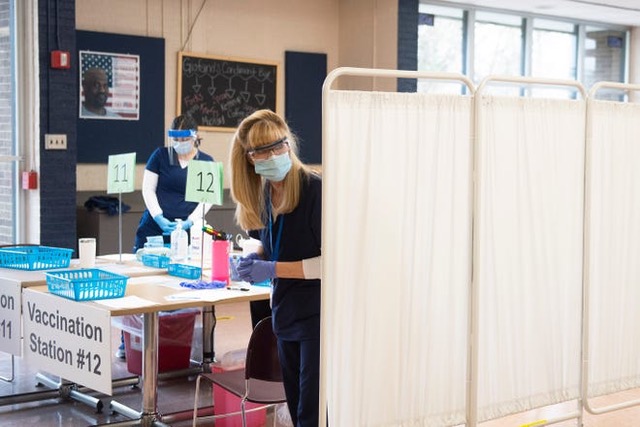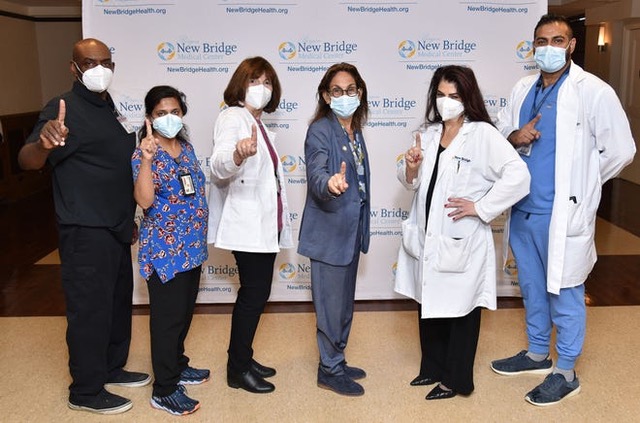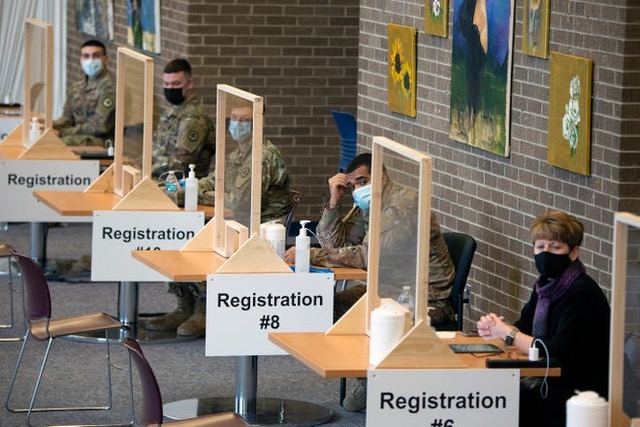COVID vaccine 'isn't the flu shot': Vaccinators explain why NJ rollout is slow
ARNOLD KOROTKIN
COVID vaccine 'isn't the flu shot': Vaccinators explain why NJ rollout is slow
What’s taking so long? That’s the question asked by hundreds of thousands of people who have flocked to New Jersey’s COVID vaccine sign-up page to get inoculated.
There are many answers, but the first is the most obvious: Demand far outstrips supply currently. The state has been allocated far fewer doses than the number of people who want them. More than a million have registered for the vaccine at covidvaccine.nj.gov, while about 600,000 vaccine doses have been received and 233,000 doses have been used.
But a second reason for the slow rollout is that the COVID vaccines are different from any vaccines given before. The data-tracking required for each dose is daunting. Storage and preparation of the vaccine require special equipment and handling.
"This isn’t the flu shot,” said Michael Maron, CEO of Holy Name Medical Center. “This is a very valuable, complex drug, and the preparation of it is a complex process.”

Finally, the largest public vaccination campaign in U.S. history is unfolding against the backdrop of the worst pandemic in a century. Hospitals are already strapped to care for the nearly 4,000 people statewide currently hospitalized with the coronavirus. Vaccine sites must guard against spread of the disease by screening patients and giving them enough space to maintain social distance.
State Health Commissioner Judy Persichilli has called for retired health professionals to volunteer for the state’s Medical Reserve Corps, which will help administer the vaccines, to help fill the staffing gap.
But “the one who gives the shots is just a very small piece of the very complex logistics that goes into giving every shot,” said Barbara Rosen, a vaccinator at Bergen New Bridge Medical Center.

“It takes a village to give one shot,” said Rosen, a nurse and officer of the Health Professionals and Allied Employees union. “Sticking the needle in somebody’s arm is the easiest part of it.”
Here’s what’s involved.
Sign-up and scheduling
The state website, covidvaccine.nj.gov, merely registers people so they can be notified when their priority group is up to receive the vaccine. It does not schedule their appointments. For that, people must choose a location and sign up there.
Each health system or hospital administering the vaccine, along with pharmacies and supermarkets such as ShopRite, has its own scheduling system. The state’s mega-site in Morris County, for example, relies upon Atlantic Health System to handle the schedule of appointments. A few, such as St. Joseph’s Health and the state mega-site at Rowan College of South Jersey, give the shots on a walk-in basis to those eligible.

For Hackensack Meridian Health, with 10 hospitals currently offering the vaccine to their staffs and law-enforcement personnel, the online appointment system mistakenly booked members of the public last week — before they were eligible. The web portal that gives patients access to their medical records, myChart, invited subscribers to sign up — and failed to filter out members of the general public.
Hackensack Meridian has “enhanced ID requirements to ensure that only those eligible for the vaccine receive it,” a statement from the health system said Monday, noting that “no one was vaccinated who should not have been.” An ID and proof of eligibility are required at the vaccine site.
Holy Name in Teaneck has developed its own software to enroll the public for appointments. The hospital plans to operate a community vaccine site with the township of Teaneck capable of immunizing 1,500 people a day, if supplies are available.
Story continues below the chart
To enroll, lots of information is required. Generally, the appointment sites ask about insurance, demographic information, pregnancy status, COVID history, recent vaccines and allergies, in addition to the priority group for which a person qualifies. And most importantly, the sign-up requires contact information — because each of the authorized vaccines requires a second dose, or booster shot, and the site will send reminders of the next appointment.
Then there are the consent forms.
The Pfizer-BioNTech and Moderna vaccines have emergency use authorization from the federal Food and Drug Administration, not full approval. A consent form spelling out the risks and benefits must be signed before the vaccine is given. Most places ask the enrollee to do that electronically, to speed the process at the vaccine site.
Cold vaccine storage, just-in-time syringes
Unlike the flu vaccine. COVID-19 vaccines “are not pre-drawn syringes you can hand to someone and store in a fridge forever,” said Maron, the Holy Name CEO.
COVID vaccines are stored at super-cold temperatures — 94 degrees below zero for the Pfizer-BioNTech vaccine — and must be thawed for a few hours before they can be prepared. Once a pharmacist dilutes the thawed vaccine, it can be refrigerated, but it must be used within six hours. It is transported to mass vaccine sites in special coolers.
